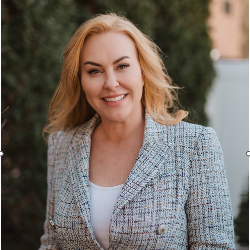Marie Leary
Every month, RG175 spotlights one of the independent school leaders we've placed, taking a deeper dive into their journey, insights, and impact. This month, we feature Marie Leary. Marie is the new Head of School at Canterbury School, a PK–12 independent school in Fort Wayne, Indiana. With nearly three decades of experience as a teacher, coach, and administrator, including a decade as Head of School at The Sage School in Foxboro, Massachusetts, Marie brings both depth and breadth of leadership to her new role. A champion for women aspiring to Head of School positions, she is passionate about cultivating strong, mission-driven leadership at every level of a school community.
A former competitive alpine ski racer, Marie launched her career at Wasatch Academy in Utah, teaching biology and coaching the alpine ski team. She later taught chemistry at Noble and Greenough School (MA), served as a guidance counselor and AP Biology teacher at St. John’s College High School (DC), led the Upper School and taught AP Biology at Barrie School (MD), and directed the academic program at Carrabassett Valley Academy (ME). She holds a bachelor’s degree in psychology from Syracuse University and a master’s degree in organizational leadership and management from Antioch University New England.
What is your connection to RG175?
My connection to RG175 began almost at its inception. In 2003, when Clay Stites worked with Carrabassett Valley Academy, he became both a mentor and a trusted guide to me while partnering with the school during a pivotal moment in its long-term planning. Over the years, at various schools and through professional development opportunities, I have connected with numerous RG175 consultants and benefitted greatly from their counsel.
During my most recent search in 2024, I had the privilege of working closely with several RG175 consultants who not only understood my aspirations for my next headship, but also offered genuine mentorship, encouragement, and friendship. Through both their professional guidance and personal connection, they demonstrated a rare and invaluable depth of understanding of independent school leadership, the nuances of governance, and the priorities of both boards and candidates.
Can you summarize your experience working with RG175?
Working with RG175 has been both professionally enriching and personally meaningful. I first met Tony Featherston when he served as a mentor during the NAIS Institute for New Heads, and his wisdom and steady guidance left a lasting impression. When I began exploring new opportunities before formally entering the search process, Tony, along with Deborah E. Reed and Thomas P. Olverson, offered candid advice, thoughtful encouragement, and a warm invitation to connect. Their early support set a foundation of trust and collegiality that shaped my entire experience.
In the Canterbury search, working with John Farber and Rebecca T. Upham was equally exceptional. They were steadfast advocates for the schools they represented and provided strategic, forthright guidance on navigating each stage of the process.Their insight helped me articulate my leadership authentically and position it within the needs of the community I hoped to serve. At every step, I felt both championed and understood, not simply as a candidate, but as a fellow leader whose success genuinely mattered to them.
If you had one thing to recommend to other candidates, what would it be?
Be crystal clear about your non-negotiables, both professionally and personally, and communicate them early in the process. The best searches result in long-term success because the match is rooted in shared values and aligned priorities, not just a compelling résumé.
Too often, candidates focus on demonstrating their adaptability without fully naming what they need in order to thrive. Defining your non-negotiables helps you discern whether a school’s culture, governance, and vision align with your leadership style and life outside of work. It also fosters trust with the search committee by showing them you are reflective, intentional, and invested in a partnership built to last.
In my own experience, being clear about what mattered most allowed me to engage authentically and focus on finding a school where my skills, values, and aspirations could be fully realized. Ultimately, the right match benefits not only the Head of School, but the entire community they are called to serve.
What do you enjoy most about your job as it pertains to Independent Schools?
I love that independent schools have both the freedom and the responsibility to define their mission and live it with integrity. That autonomy creates space for bold, student-centered decision-making and the agility to meet challenges with creativity and courage.
At Canterbury, the deepest satisfaction comes from being part of a community where every student is known by name and valued for who they are, and where faculty and families share a collective commitment to excellence and the joy of learning. In my nearly 30 years in independent education, I have sought to cultivate environments where risk-taking, inquiry, and vulnerability are not only encouraged but celebrated, because meaningful growth happens when people feel both safe enough to stretch and challenged enough to rise.
The joy lies in the daily interplay of tradition and innovation, honoring what is timeless while embracing what is possible. In those moments, you can see Canterbury’s mission come to life and know the work is shaping futures in ways that will last.
